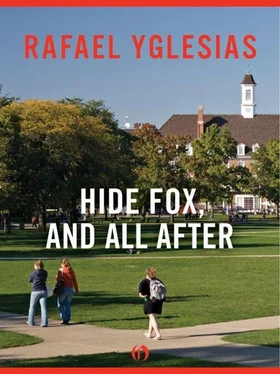“Come on!”
“All right, all right.”
“So,” Mr. Shaw continued, smiling, “dentures make you whistle when you speak.”
“Yes?” Alec drew the word out, mocking.
“Since I’m a radio announcer, I had to go to a speech class to learn how to avoid that. It took me two weeks. Two weeks’ pay.”
Alec gasped, laughing.
“And the cost of the lessons.”
Alec banged his hand on the dashboard repeatedly, his amusement having no other outlet. Raul looked from Mr. Shaw to Alec, trying to understand.
Mr. Shaw glanced at Alec, whose face was a vibrant red. “The poor boy’s going to die.”
“I don’t understand this at all,” Raul said with an embarrassed laugh.
“It certainly is confusing,” David said. The two looked at Alec: Mr. Shaw, calm and knowing; Raul’s face fixed in wonder. David returned his attention to driving, Raul gazed on at Alec. Alec sighed for a time, looking out the window, occasionally letting out a reminiscent guffaw.
A silence followed that left the situation so unrelieved that Raul burst out with, “What the hell were you laughing at?”
Alec giggled. “Nothing. Nothing at all.”
A thin line of Mr. Shaw’s lips extended themselves in profile. Alec leaned over to Raul. “I’ll tell you later,” he whispered.
“We’re here,” David said. Alec opened the door. “By the way,” Mr. Shaw continued naturally, “altogether it cost two thousand twenty-eight dollars.” Alec nearly fell into the street. Raul laughed appreciatively and got out to greet a bent-over Alec. “Thanks for helping with the couch, boys.” And Mr. Shaw drove off smiling.
“What were you laughing about?”
They started down the steps that led to the rear courtyard of the theater.
“Listen to how insane this is. My father had that operation two years ago.”
“You’re kidding!”
“Two years ago. And it was nothing. It was an ugly operation, but it didn’t cost anything like he said it did. He did have to go to a speech school, but he’s manager of the station. He does his program because he wants to — he doesn’t depend on it for money. Anyway, ever since then, it doesn’t matter who it is, he tells this story. I used to be his accomplice, but I haven’t done it with him in a long time, and the price has just soared to incredible heights. So I had to laugh at one point. From then on, I was in a rut.”
They had gone up the metal stairs of the side entrance to the theater. Ignoring the door leading to the auditorium, they climbed a short flight of stairs past the ladder up to the hellhole and opened a heavy black door leading onto the backstage of the theater. They were laughing all the way, Raul not yet conscious that he was in the school. Once on the stage, crossing over, both posed before the empty auditorium.
A backdrop was down, two lights lit the bleak stage. Raul, in black, moved in the imagery of that blurred heat. Alec was posed tragically upstage; Raul, downstage center, scanned the audience with a gaze “as blank and pitiless as the sun.”
“ ‘Death is a twofold enormity,’ ” Raul quoted, low and fierce.
“Or a one-sided grotesque.”
A hideous smile passed over Raul’s face.
Alec moved downstage to meet Raul coming upstage. Meeting, they bowed with great exaggeration. Raul, coming up from the bow, was badly shocked by Mr. Miller’s voice.
“There you are,” he said with anxiety. “Where have you been?” But without waiting for an answer, he turned around and went offstage left, toward the phone. Alec had followed him; Raul, stunned, dumbly followed both. Mr. Miller said into the phone, “Mr. Henderson’s office, please.” He looked at Raul. “I’m making an appointment for you.”
Alec also looked at Raul, frightened and anxious. “Yeah, it will be good for you to speak to him. Tell him the truth. Tell him exactly what you feel about the school.” Alec implored the only way possible — by order.
Raul gave a little hysterical laugh. “Oh, I see. I see. I’ll do that.”
Mr. Miller murmured into the phone. A heavy, hot drop of sweat fell down Raul’s armpit, broadening when absorbed by the fabric of his shirt. He watched a small cloud of dust rise up on the stage. He took the velvetlike material of the backdrop between his fingers. Mr. Miller replaced the phone. “Go over there right now,” he said.
Mr. Franklin A. Henderson, headmaster of the Cabot School, had taken over the job as recently as this school year. He was, however, no stranger to Cabot. He had graduated from it, gone on to college, getting his master’s and Ph.D. in English, returning there to teach. He was hired as headmaster for a less prestigious school, when, with the retirement of Harold Barrow, he was surprisingly chosen for the job — surprisingly, because older, more experienced administrators, a number of whom had been at Cabot longer than Mr. Barrow, were available.
He was young, in his early forties; ambitious, it was rumored that the headmastership was merely a steppingstone for an administrator’s post at a college; enterprising, he had, within the first month, changed two very basic, traditional rules — the hair and dress restrictions — and a man sympathetic to student needs.
This capsule, this image of the man, was swallowed whole by students, faculty, and parents, but not without adverse reactions. A few faculty were openly hostile, nearly all trustees were decidedly hostile, and a group of parents had joined together using their sons as spies for any marked deterioration in the student body, pushing for his ouster. In the middle of the school year one parent from the group, armed with a list of all students suspected of smoking marijuana and demanding their expulsion, would present it to him and Mr. Henderson, in the company of that parent, was to tear up the list.
Mr. Henderson, for reasons not completely unselfish, wished to be in closer contact with students than had been the rule in the past. He was, however, diverted from that purpose on all sides. He was expected, as all past headmasters had done, to speak at luncheons for donations to the school; to smile and nod to donors who were particularly generous; to be at all board meetings; and to give all the stilted speeches yearly inflicted upon the students. Mr. Henderson had wanted to teach a course of his own; in fact he had cherished the idea. One of the more influential trustees, when the idea was presented to him, said with a blank look, “Why, Franklin? What for?”
Every facet of his life was under pressure. His wife and older daughters constantly complained of the necessity of living in Yonkers; the trustees never ceased to grumble about the ninety thousand dollars spent to build his house — a demand his wife had forced him to make. He had had an ugly scene with his son, with whom his relations were normally good. It was known that John had been friendly with a student notorious for his drug activities, and Mr. Henderson had had to ask him to see the boy less often. Though he had known that his son smoked, he had carefully avoided mentioning it, until the necessities of his image forced him to ask him to stop. It created a painful gap. But Mr. Henderson believed that, if this year went well, the pressure would let up.
To Raul, Franklin Henderson seemed like a Robert Kennedy of the American educational scene — Robert Kennedy, about whom Raul had marvelously ambivalent feelings. He admired Henderson the way one would admire the blatant ego of a Napoleon and detested him as a man who would prevent polarization and thereby perpetuate the system for another twenty, thirty years. Reforms merely smoothed over the manifestations of the real problem: changing hair and dress rules didn’t change the arrogance and condescension of the educational process.
Читать дальше











